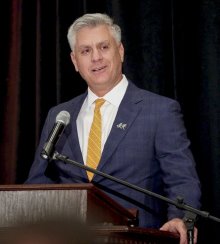
This year’s annual Head of School address commenced with the Tiger Tones’ captivating rendition of Earth, Wind & Fire’s classic hit song, “September”: “Do you remember the 21st night of September? Love was changin’ the minds of pretenders, While chasin’ the clouds away.”
The Annual Head of School address, held in the Alumni Gym on, yes, September 21, began with remarks from Board of Trustees President Vicki Craver. Craver underscored the pivotal role of the board and emphasized the importance of community support through volunteerism, the Annual Fund, and the Capital Campaign, which has already raised $118 million of its $135 million goal. “As someone whose first child came to this school in 2006, I have seen first-hand how every building on this campus is the result of those who came before. My children have benefitted from the gifts of others who had the foresight and willingness to create this amazing place—it is this ‘pay it forward’ model that is Tiger Pride.”
Always a highlight of the Annual Meeting, this year’s Distinguished Faculty & Staff, Nina Basinet, Michele Ross, and Sarah Sepot, were honored for 25 years of service.
Head of School Adam Rohdie then took the podium to address the school about Country Day’s mission and its vital importance for today’s children. He shared vignettes of students engaged in deep and joyful learning throughout the campus.
“The greatest schools can do something special and something rare—they can create a safe learning environment, where students are known, loved, valued, and respected by caring faculty and staff. If they are able to do this, the children at their school will undoubtedly discover and share their voice, develop the confidence and determination to apply the knowledge and skills they have learned to any given situation, have patience, think critically, and pursue meaningful questions to solve complex problems, express gratitude and build integrity, be empathetic and kind, and feel a true sense of belonging.”
“In short, they will grow into young adults who will have the skills and attributes to go out and shape the world for the better.”
Mr. Rohdie asked, “What is our purpose here at GCDS and perhaps, most importantly, are we fulfilling our purpose?” He spoke about how GCDS is succeeding in traditional metrics of enrollment, facilities, parent engagement, college list, and sports and artistic championships. Yet Mr. Rohdie expressed concern about the culture in which children are being raised. He cited an article by David Brooks in The Atlantic, “How America Got Mean.”
In the article, Brooks points to a statistic that the percentage of high school students who report “persistent feelings of sadness or hopelessness” shot up from 26 percent in 2009 to 44 percent in 2021. Brooks provides four narratives to explain how we find ourselves in this environment: the isolation caused by technology; the decline of participation in community, civic, and religious organizations; demographic shifts that cause dislocation; high levels of economic inequality and insecurity. Mr. Rohdie had another explanation.
“Schools across our country have abdicated or have been kept from their role in educating children to be moral and ethical young adults, to have growth mindsets, to acquire a set of skills that allow them to become mature, lifelong learners.”
“GCDS finds itself with the challenge and the responsibility to create an environment in which continuous, effervescent, immeasurable growth can happen. My challenge to the faculty in August was to create an environment where every day students will wrestle with wrong and right, will debate vexing dilemmas, will want to learn for learning’s sake, will work collaboratively, will speak in public about what they believe, will care for their friends, their family, their community, and their planet.”
“I can say that what gets me out of bed every morning, what lights my fire, and why I know this school is such a special place, is every day I get the chance to work with the greatest faculty and staff anywhere. Our faculty create opportunities for growth every single day. They live this job and despite the numerous challenges—they consistently churn out deep and joyful learning experiences. They create relationships with their students who end each year knowing that they have been held closely by a teacher who loves them.”
For Mr. Rohdie, these relationships are a lifeline for students. “Our children are far more likely to make the tough choices, to weather the storms and sail out the other side a little wiser, knowing there is an adult in their corner who values them and cares about them. Watching our faculty and staff do what they do best, helps me to remain optimistic.”












.JPG&command_2=resize&height_2=85)





.jpg&command_2=resize&height_2=85)



